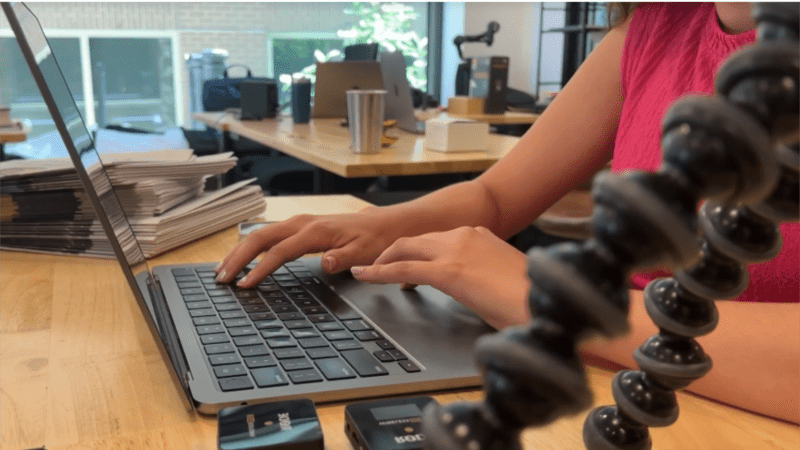Washington, D.C. — As the clock ticks toward the 2024 U.S. presidential elections, a quiet storm brews not in the streets or the voting booths, but in the digital spaces where Hispanic communities seek answers. There, within the fast-moving currents of social media, misinformation swirls like a thick fog, clouding the truth and spreading fear. With ballots soon to be cast, newsrooms across the country stand on alert, ready to dispel the shadows and bring clarity to those who need it most.
The fight against misinformation is not new, but it has taken on a more urgent tone as the Hispanic community grows both in number and in political significance. In this moment, trusted voices like those of the El Tiempo Latino rise, determined to cut through the noise with facts, understanding, and compassion.
A Community Under Siege: The Spread of Falsehoods
There is an ache, a deep worry shared by many journalists who serve the Hispanic community. They watch as false narratives, born from ignorance or malice, travel faster than light, embedding themselves in the hearts and minds of those they love. One of the most troubling of these falsehoods is the claim that immigrants are illegally voting in the elections, a lie designed to sow distrust and division.
Claudia Ginestra, a journalist at El Tiempo Latino, has seen firsthand the confusion and fear that such misinformation stirs. “We’re in a critical time,” she says, her voice steady but full of concern. “People have more questions than ever before. They’re asking us not just about the voting process but whether what they’re seeing online is true.”
These lies do not travel alone. They come wrapped in slick videos and doctored images, often spread by anonymous figures hiding behind screens. Platforms like TikTok have become breeding grounds for these false stories, where one video spawns many, each carrying the same dangerous narrative in different forms.
The Role of Trusted Newsrooms: A New Kind of Battle
In these trying times, newsrooms like El Tiempo Latino and organizations like Factchequeado have emerged as warriors in the fight against misinformation. With quick responses and precise facts, they strike down the falsehoods before they can take root. But this is no easy task.
“The speed at which misinformation spreads is staggering,” says Laura Zommer, co-founder of Factchequeado. “One video goes up with a misleading claim, and then, before you know it, there are three more just like it, each from a different account, saying the same thing.” It is a battle of truth against the machine of misinformation, a war waged in comments sections and direct messages.
These organizations have embraced new methods to reach their audience, knowing that the old ways of delivering news may not be enough. Short, clear videos now play a vital role, traveling far across social media platforms, meeting people where they are. The facts are made accessible, even in a sea of distractions, reminding people of their power and their voice.
Searching for Truth in the Digital Age: Where Do Hispanics Get Their News?
A study by the Pew Research Center reveals an important truth: nearly 90% of Hispanic adults in the U.S. get their news through digital platforms. These numbers tell a story of a community deeply connected to the internet, with 74% relying on search engines and 56% turning to social media for the news they trust. But within that same space, where answers are sought, dangers lurk in the form of false headlines and manipulated images.
As Zommer notes, the influence of artificial intelligence has only made this problem more complex. AI-generated content multiplies the spread of misinformation, making it harder to recognize the false from the true. The tools we once believed would connect us have, in many ways, pulled us apart.
The Call to Action: United Efforts in a Time of Need
It’s easy to feel overwhelmed by the scale of the challenge. But the Hispanic community is not without hope. Journalists, fact-checkers, and allies across the nation have come together, united by a shared mission: to ensure that everyone has access to the truth.
Marcos Porras, a reporter with El Tiempo Latino, has seen the effects of their work. “We know the power of accurate information,” he says with quiet determination. “When we share the truth, people respond. They want to learn. They want to understand.”
This collaboration between news outlets like El Tiempo Latino and verification organizations such as Factchequeado represents a new model of journalism—one that understands the urgency of the moment and the critical role of timeliness. Together, they debunk harmful narratives and provide readers with the tools they need to make informed decisions. In a world where lies travel fast, they are the calm voice of reason, guiding their community safely toward the light of truth.
Misinformation and Its Many Forms: A Persistent Threat
The lies persist, even now, as November approaches. The false claim that undocumented immigrants are voting remains one of the most prevalent, fanned by those who seek to undermine trust in the democratic process. These stories spread like wildfire, carried by fear and suspicion, but the journalists who serve the Hispanic community stand ready to extinguish them.
VOA Verifica, a special section of the Voice of America, plays its part as well, bringing forward facts and clarity. Their reports dissect the lies, offering the correct information on topics from migration to the very essence of the voting process.
An Ongoing Battle, a Community United
This is not just a fight against misinformation. It is a fight for the soul of a community, a battle for the dignity of each voter, of each individual. As the election approaches, the journalists, the fact-checkers, and the community itself stand together, ready to face the challenges ahead.
The stakes are high, but as the Hispanic community knows too well, resilience runs deep in their veins. They have faced many battles before, and they will face this one too—with truth as their shield and unity as their strength.


